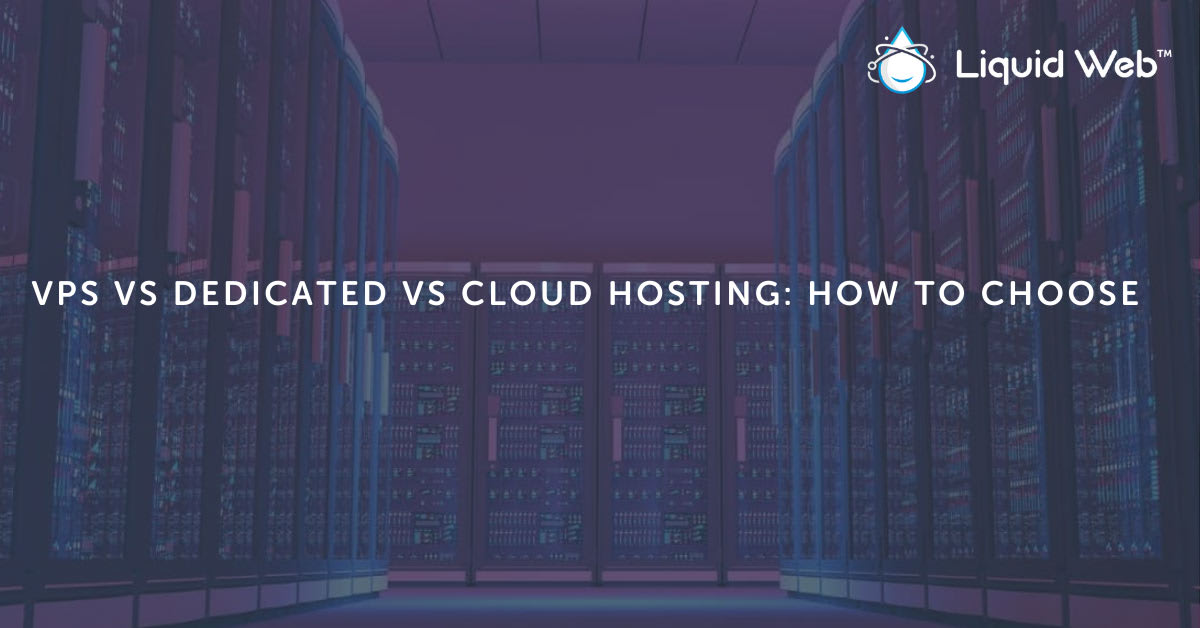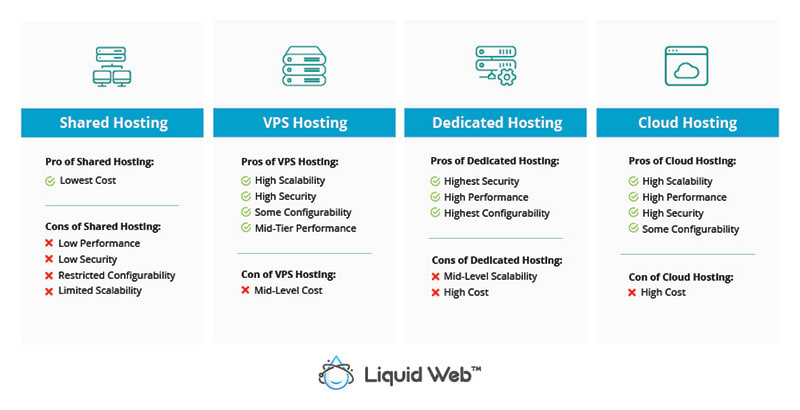
There is more to selecting the right hosting product than just pricing. In fact, basing your decision entirely on price is a recipe for disaster. When comparing prices on shared hosting vs VPS vs dedicated vs cloud hosting, it may seem like a no-brainer to sign up for the cheapest option available, right?
In reality, price isn’t always the best indicator of which solution is right for you.
Not sure what kind of server hosting solution you need for your business? Check out the core differences between hosting types to help you make the right decision.
Here’s a look ahead at the contents of this comprehensive guide to hosting:
Before making an informed decision about what hosting type to choose, let’s first go over the definitions of shared hosting vs VPS vs dedicated vs cloud server hosting.
What is Shared Hosting?
Shared hosting is the most basic and cheapest of the hosting tiers. These plans allow you to rent space on a shared hosting server. These servers host many other websites on the same server alongside your website. These plans are the cheapest solutions, as they provide the least performance, security, and flexibility.
What is VPS Hosting?
Virtual Private Server (VPS) Hosting is a cross between shared hosting and dedicated hosting. A physical server (also called the parent) runs several VPS instances, which are granted a strict portion of the parent server’s hardware resources. These instances are rented out and operate as independent servers from one another. So, it’s essentially renting part of a dedicated server. These plans vary in price and offer affordable scaling, better performance, and better security than shared hosting.
What is Dedicated Hosting?
Dedicated Servers are precisely what the name implies: a single server dedicated to you. All the hardware that makes up the server is under your control. Bare metal servers often share network access with neighboring dedicated servers in a data center, but they share no hardware. These hosting plans tend to be more expensive than shared or VPS but can give you better performance, security, and flexibility, especially for those requiring custom configurations or specific hardware.
What is Cloud Server Hosting?
Cloud Servers, also known as public cloud hosting, are scalable cPanel hosting solutions on an enterprise-grade cloud platform. Cloud hosting launches in minutes and scales quickly up and down as needed for traffic fluctuations or workload requirements. Best of all, the servers are highly reliable with redundant hardware and high availability built in. These plans also tend to be more expensive but give you the best scalability, flexibility, agility, and cost-efficiency.
Now that we have a basic understanding of what all four hosting solutions are, let’s compare shared hosting vs VPS vs dedicated vs cloud server hosting by a few different metrics to see how we obtained this tier structure. This evaluation applies to products from any host, not only Liquid Web.

Shared Hosting Pros and Cons
If you are running a web agency, you are not alone in thinking that shared web hosting, often as little as $5 per site monthly, is the most cost-effective solution for your business.
However, take a deeper look, and you will quickly see how the financial, functional, and emotional benefits of a more robust plan from a managed host provides far more bang for your buck. Managed hosting gives you the performance, security, configurability, and scalability that you need to grow your business.
So, before getting into VPS vs dedicated, let’s look at the most basic option: shared hosting.
Pro of Shared Hosting
Lowest Cost
Shared hosting packages are very low-cost due to their shared nature. Shared hosts often oversell their hardware, which means more users reside on the server than a server can handle if all users were fully active. This allows small sites to be packed in around busier sites, which can work for some and not for others.
Cons of Shared Hosting
Low Performance
These plans generally include very limited resources, as they are granted only a fraction of the available system hardware. A shared hosting account holder can find themselves robbed of resources by other sites on the same server, monopolizing the limited resources. The shared hosting tier is good for low-traffic and static websites.
Shared hosting platforms are not usually set up for high volumes of traffic and processing since the server power must be distributed between dozens or sometimes or even hundreds of other users and websites. But, for average sized and trafficked sites, such as hobby sites, or pamphlet information-only domains, or even small blogs, shared hosting is perfectly acceptable.
Low Security
The activities of other sites on the server can affect your clients’ sites, putting them at risk of viruses, hacking, and other common security issues. The more domain names pointed to your shared server’s IP address, the more often it is targeted for an intrusion.
Restricted Configurability
Each user is highly restricted in their own environment. Customization is limited to surface-level changes such as .htaccess, PHP versions, or a specific list of modules. There is no access to any service or server-level configuration.
If you need to have specific software installed, it is uncommon to find a shared hosting package that includes the exact server-level configuration you might require (though it is common to find hosting providers that will already have installed popular software, like FFMPEG or ImageMagick). And, it would also be unlikely that your host would install a special package for you on a shared machine, which could pose a security risk to other tenants.
As such, a shared hosting package offers much less control.
Limited Scalability
Shared server packages are generally not very elastic. The user is confined to a package that allows specific limits based on bandwidth, disk usage, and other factors, depending on the hosting provider. This package can be upgraded or downgraded based on your needs and price point. Unfortunately, scaling upward is limited due to the division of resources among shared users, which could force a migration to a new server or product type. Options for changing the resources on your package generally include increasing your disk quota, and in some cases, removing limits on your CPU access.

VPS Hosting Pros and Cons
When we shift gears to understand the benefits of VPS hosting, we see that performance matters. If you want to keep your clients happy, you need to provide them with top-notch performance.
A survey conducted by Kissmetrics discovered that nearly half of web users expect a site to load in two seconds or less, and visitors tend to abandon a site that won’t load within three seconds.
Furthermore, the survey found that 79 percent of web shoppers who have trouble with website performance say they won’t return to the site to buy again and around 44 percent of them would tell a friend if they had a poor experience shopping online.
A second difference in page load speeds has the potential to lose out on revenue from frustrated visitors. To better inform our comparison of VPS vs dedicated servers, make sure you understand the pros of dedicated virtual server hosting.
Pros of VPS Hosting
High Scalability
VPS systems are extremely flexible in scale factors, as they have more functionality available for adding and removing resources, including CPU cores, system memory, and additional disks or disk space through your hosting provider. They are only limited by the available hardware on the parent server. However, they are generally portable between like parents, so they can be easily moved and upgraded with minimal downtime and turn-around time for upward scaling.
High Security
Each user occupies their own space, isolated from their neighbors with independent IP addresses. In rare instances, a virus may bypass the hypervisor, which could leave all sites on the VPS server vulnerable. VPS and dedicated solutions both provide high security, but if you’re examining the margins of VPS vs dedicated hosting, dedicated still takes the top spot for security.
Some Configurability
There are very few restrictions on a VPS. Each environment is separate from the others on the server and acts exactly like a dedicated server with a few off-limit configurations. Direct access to hardware is the most significant restriction. This prevents running hardware emulation within the VPS and accessing non-network attached storage devices.
In terms of controllability with installing specific software and custom configurations, a VPS server gives you complete access into your system so that you can enable, disable, install, or remove any software you wish and adjust configurations exactly to your specifications. Additionally, with VPS Hosting, you aren’t restricted to the software that your hosting provider places in your environment.
Mid-Tier Performance
Depending on your needs, this could be a pro or con. VPS (vs dedicated) instances are limited by the available hardware assigned to the plan. There is a performance tax on the hardware when running in a visualized setup. However, this tax has become smaller over time and provides more comparable performance levels to dedicated servers.
Con of VPS Hosting
Mid-Level Cost
Variable cost is another factor that could be a pro, but it will still be more expensive than the low cost of basic shared solutions. VPS solutions come in many forms, from the smallest 2GB server to massive 128 core machines. VPS parent servers are often built from the very best hardware available at the time to offer the most varied amounts of configurations for users. When it comes to VPS vs dedicated servers, both will be a higher price point than shared hosting.

Dedicated Hosting Pros and Cons
Now that we’ve established some of the major shortcomings of shared hosting, let’s dive deeper into VPS vs dedicated hosting. Dedicated servers can do anything when it comes to hosting solutions. They are the backbone for all Internet-hosted sites or applications. All software has to run on physical hardware in some form or another, so there really is no limit to what can be done with dedicated servers.
You can even use a dedicated server in conjunction with other dedicated servers to set up clustered or high availability services to prevent or reduce downtime during critical hardware events.
A single dedicated server can be used as a parent server to multiple VPS servers running hardware emulation. Those VPS instances can be moved between similarly configured multiple parent servers to allow for more/less hardware as needed. Dedicated servers vs VPS provide total control over your hosting environment.
Pros of Dedicated Hosting
Highest Security
Because you are the only one using the dedicated server, the risk of attack is minimal. Your connection, along with your hardware, is completely private and contained. One other important consideration is that dedicated hosting can take advantage of more advanced security measures such as a traditional hardware firewall, while shared and VPS hosting solutions cannot. This is a prime example of why there is more to selecting the right hosting product than just pricing.
High Performance
Dedicated servers allow direct access to the hardware and provide amazing performance for specific configurations.
Highest Configurability
Dedicated servers can be configured any way you choose with no limitations or restrictions from the host because the user has direct access to the hardware. And just like how VPS hosting offers greater control with installing specific software and setting configurations, the same can be said for dedicated servers and cloud servers. However, keep in mind that although VPS and dedicated servers offer greater configurability, shared hosting only offers surface-level customization and controls.
Cons of Dedicated Hosting
Mid-Level Scalability
Dedicated servers have great performance but are limited by the physical hardware and space in their chassis. Upgrades are always possible but may require significant downtime or migrations depending on the needed upgrade. Server clustering and high availability solutions can limit this but generally have a much larger price point. Once again, the difference can be marginal, but when comparing dedicated server vs VPS, top scalability is awarded to VPS hosting.
High Cost
These servers will have a larger price point in both monthly recurring fees and hardware upgrades. Dedicated server cost results from paying for the hardware you are using and not piggy-backing off of a larger hardware set used for VPS configurations. It’s important to note that cost will also vary based on your decision between managed vs unmanaged dedicated servers.

Cloud Server Hosting Pros and Cons
With a cloud server, scalability is on-demand and occurs as resources are needed with no downtime. Similarly, if a hardware malfunction or security issue arises, VPS hosting could require downtime to replace the hardware in the parent server or to patch the downed systems. With a cloud server, the cluster is redundant, and there is no downtime for the end users or website/application visitors, leading to a better experience.
Pros of Cloud Hosting
High Scalability
By its very nature, public cloud servers can scale up and down very quickly to meet traffic and resource demands at an unprecedented rate. With greater burstable bandwidth and elasticity levels, cloud servers are the most scalable type of hosting available. Cloud servers exist across multiple servers using virtualization to glue them together.
High Performance
Cloud servers also grant amazing performance, especially for sites and applications prone to uneven traffic or that require resources to increase quickly.
High Security
Cloud servers are proactively monitored for security threats. Since they are redundant by using virtualization across multiple servers, you can be sure your site stays online in case something does happen.
Some Configurability
Like VPS and dedicated hosting solutions, cloud servers also grant complete access to the systems and are a highly scalable cPanel solution, so the sky’s the limit for configuration. Unlike dedicated servers that give complete control, cloud servers have no root access for customers and are used exclusively with Linux and cPanel.
Cons of Cloud Hosting
High Cost
Cloud servers are relatively similar in cost to dedicated servers. This difference in pricing is because cloud servers provide access to a cluster of highly available servers. Scaling among these highly available servers is only limited by the unused resources available at the time across the connected servers.
Shared vs VPS vs Dedicated vs Cloud: How Do You Choose?
When deciding between shared vs VPS vs dedicated hosting vs cloud hosting, make sure you select a hosting provider that will not only meet your needs today but also be able to accommodate your needs into the future. While it is easy to see that shared hosting is a cheaper solution, it can also get much more expensive for web agencies in the long run.
The hosting solutions laid out in this resource all have their respective benefits and drawbacks to consider when trying to decide which will work best for your needs. In most cases, your unique needs may need to weigh what features and functionality matter most.
Here’s a recap of which hosting you’ll likely want based on the pros and cons of each:
- Shared Hosting: As the most basic offering, shared hosting does not provide much performance, security, or flexibility. However, shared hosting has the lowest overall cost. This type of hosting is best suited for low-traffic and static websites.
- VPS Hosting: With lower costs than dedicated or cloud hosting, VPS is a middle-of-the-road offering with affordable scaling and better performance and security than shared hosting. VPS hosting is an excellent choice for production and development environments, as it can house most websites and applications while still providing great performance.
- Dedicated Hosting: A suitable option with better performance and security than shared and VPS hosting, dedicated hosting also has more unrestricted configurability than cloud servers. However, cloud hosting has more in the way of scalability. Dedicated servers are premier hosting solutions and can handle the needs of almost any website or product, especially those involving specific configurations or legacy applications.
- Cloud Hosting: Although the highest cost compared to shared, VPS, and dedicated, cloud hosting is a premium, top-of-the-line solution. Cloud hosting is best for those that need a quickly-deployable, scalable, and stable cPanel solution.
As you choose your preferred hosting, try and remember the old adage: “You get what you pay for.” It really is the case when it comes to the hosting service you choose.
[ad_2]
Source link







